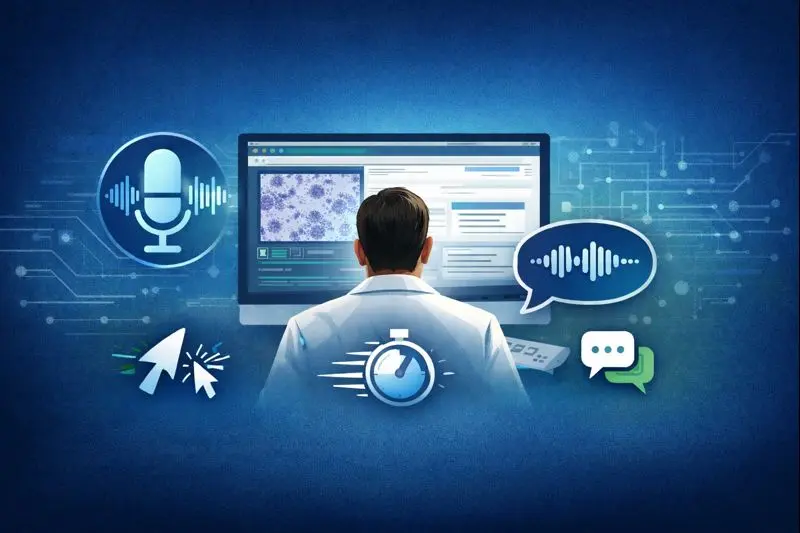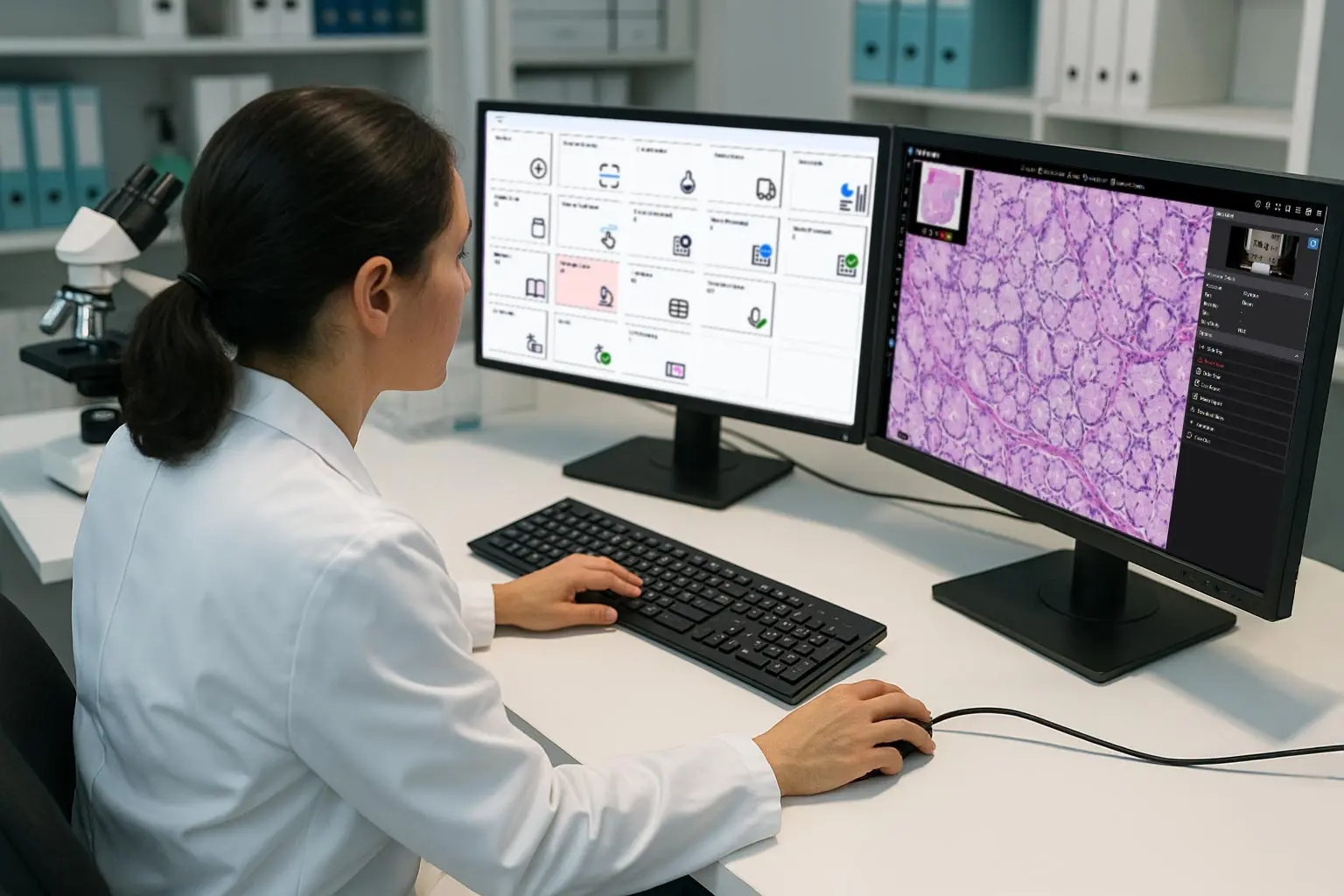Blog
Laboratory Information System Software and Its Role in Overcoming Laboratory Staffing Challenges
June 30, 2025
(This is part two of a three-part series focused on laboratory staffing.)
Welcome to part two of our blog series on laboratory staffing challenges, where we’re uncovering the root causes of the problem and identifying possible solutions for lab directors and managers to consider.
For part one, we sat down with Dr. James Crawford, Senior Vice President for Laboratory Services at Northwell Health and Professor and Chair of Pathology/Lab Medicine at the Donald & Barbara Zucker School of Medicine at Hofstra/Northwell. Dr. Crawford shared his view on topics such as recruitment, compensation, career advancement, and process improvements. Click below to review part one of this series in its entirety.
For part two, we turned to Bri Spencer, Molecular Lab Manager at Avero Diagnostics, for a deep dive into how the growing lab operation, which specializes in anatomic pathology, clinical laboratory, and molecular diagnostics, is utilizing new pathology reporting software technology and a spirit of innovation to streamline its laboratory workflow management and remove time-consuming and redundant manual processes.
First, here’s a recap of the current situation.

Modern Laboratory Information Systems: The Long-term Solution to Staffing Challenges
As every lab professional knows, medical laboratories play a critical role in healthcare. Nearly every time a patient enters a hospital or healthcare facility, their diagnosis is in the hands of a medical laboratory professional. Unfortunately, the industry is currently in a precarious situation. It’s experiencing unprecedented labor shortages, especially for medical laboratory technologists.
The American Society for Clinical Pathology released a report in 2018 that found an average vacancy rate of nearly 9 percent in almost every lab specialty. In some departments, the rate was as high as an eye-popping 25 percent. The Bureau of Labor & Statistics supported these findings by estimating the industry needs to increase its laboratory technologists and technicians workforce by nearly 13 percent, almost doubling the increase for all other occupations. That means the industry, consisting of roughly 335,500 medical professionals, could soon be short 44,000 workers.
But there is some good news. Modern laboratory information systems (LIS software) are vital tools that lab directors and managers can leverage for help. In part one of our series, we identified that advanced LIS systems should be part of any long-term pathology lab management solution to the staffing crisis by making medical laboratories more efficient and less reliant on manual steps.
Modern LIS systems, such as the LigoLab Medical LIS & Lab RCM Informatics Platform, manage all aspects of diagnostic testing. They serve as the driver of laboratory data, supporting the patient and the specimen lifecycle as it’s inputted into the LIS lab solution, and then tracked, processed, and reported on. These LIS systems also enable lab directors and managers to build rules and deploy automation that helps compensate for knowledge loss and employee turnover.
As Spencer shared below, that’s exactly how Avero is overcoming some of its staffing challenges.
Learn More: Best LIS Software - Maximize Growth With Cutting Edge Pathology Lab Management Software
How Avero Leveraged Its Laboratory Information System to Simplify Molecular Lab Operations
Avero had already selected LigoLab as its partner for both operational and financial laboratory management when the COVID-19 pandemic began. As an early adopter of LigoLab’s direct-to-consumer lab testing portal, TestDirectly, the lab was well-positioned to streamline patient services during the crisis. When demand for molecular PCR testing surged, Avero rapidly scaled its capacity, processing over 20,000 specimens per day at the height of the pandemic.
Learn More: What is the Best LIS for Molecular Testing Labs?
“For our COVID-19 testing program to be successful, we had to be extremely accurate and our turnaround times had to be incredibly fast,” said Spencer. “But we were up against staffing shortages and extreme demand. As such, manual order entry and follow-up chokepoints had to be removed and replaced to accommodate the demand.”
According to Spencer, Avero would not have been able to quickly scale up and meet the molecular LIS testing demand without LigoLab’s agile pathology lab reporting software, which offered a wide range of configurations to accommodate new clinical lab workflow requirements. It also featured a proprietary interface engine that maximized connectivity, enabling the lab to add new analyzers and robotics to boost throughput.
A major factor in Avero’s success was its implementation of TestDirectly, LigoLab’s web-based direct-to-consumer lab testing portal that connected patients to a fully digital clinical lab workflow. By replacing paper forms with online self-registration and scheduling, the portal eliminated bottlenecks. It also automated result delivery through email and text notifications, allowing Avero to manage high daily volumes efficiently, without compromising accuracy or turnaround times.
Learn More: Highlighting the Versatility of the TestDirectly Direct-to-Consumer Lab Testing Portal

Innovation and the Adoption of New Laboratory Information System Technology to Meet Unprecedented Demand
By leveraging pathology lab report software via LigoLab’s LIS system and direct-to-consumer lab testing portal, Avero was able to process thousands of molecular PCR tests daily - and well over a million cases in the pandemic’s first year - and all this was accomplished with an incredible 98 percent of cases reported to patients and stakeholders within 24 hours of the lab’s receipt of the specimen.
This would not have been possible without a true spirit of innovation behind the Avero-LigoLab partnership, plus a flexible and supportive informatics platform to manage everything from patient self-registration and scheduling to report delivery and laboratory billing (lab revenue cycle management) for services rendered.
“During public health events like the COVID-19 pandemic, time is a critical factor,” added Spencer. “Patients, healthcare workers, and public health officials all need to know in real-time what’s happening during an outbreak. That’s nearly impossible to do with manual processes, and that’s another reason why technology adoption is a must for today’s labs.”
The decision to implement new technology at the height of the pandemic was risky, but it paid off for Avero Diagnostics. Throughout the pandemic, the lab served as a trusted testing partner for several drive-through collection sites in multiple states. It also partnered with public health departments and other government agencies such as the Florida Department of Health and the Washington State Department of Corrections. Additionally, it also supported organizational testing for employers, school and university systems, the entertainment and production industry, and more.
Final Thoughts About Laboratory Information System Software
Although the latest LIS laboratory information system technology doesn’t replace the critical work that highly trained lab professionals perform, it can help ease some of the burden caused by today’s staffing challenges, empowering medical laboratory technologists to spend less time on redundant and manual tasks, and more time putting their unique skills and training to good use and better patient outcomes.
Going even further, if a medical laboratory has plans to scale faster and become more profitable, it must operate more effectively by automating core processes that streamline both operational and financial performance.

About LigoLab
LigoLab is an award-winning provider of innovative end-to-end laboratory information system software for medical laboratories, servicing hundreds of facilities nationwide. As a comprehensive enterprise-grade pathology lab software solution, the LigoLab Medical LIS & Lab RCM Informatics Platform consists of modules for anatomic pathology, clinical laboratory, molecular diagnostics, lab revenue cycle management, and direct-to-consumer lab testing, all on a single powerful and integrated LIS software platform that supports every role, department, and case.
LigoLab empowers medical laboratories to differentiate, scale, and become more compliant and profitable.






